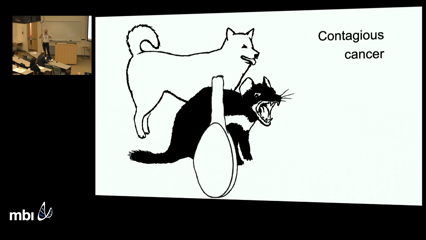
Michael Metzger
Cancer is normally an evolutionary dead-end—neoplastic cells that arise and evolve within an organism either regress or they kill their host, and the death of the host marks the death of the cancer lineage. However, in some cases, neoplastic cells develop the ability to spread from individual to individual, turning from conventional cancers into clonal contagious cancer lineages. The natural transmission of cancer cells has been observed in two mammals (Tasmanian devils and dogs), and we have found that a leukemia-like disease in soft-shell clams (Mya arenaria) is due to the horizontal spread of a clonal cancer lineage. We also analyzed mussels (Mytilus trossulus), cockles (Cerastoderma edule), and carpet shell clams (Polititapes aureus) and found that the neoplasias in all three of these species are due to independent transmissible cancer lineages. We are currently assembling a reference genome using PacBio sequencing combined with HiC data. Using draft reference genomes, we are investigating genomic changes in the evolution of this unique cancer lineage, including SNPs, structural variation, and copy number variation. In particular, we found a retrotransposon, Steamer, which is expressed and amplified in genomic DNA of the contagious cancer lineage, expanding from 2-10 copies per haploid genome in normal animals to >100 in neoplastic cells. Genomic analysis of cancer samples from isolated clam populations in Maine and Prince Edward Island confirm initial qPCR analysis, and it shows that at least 130 sites are found in cancer cells from both populations. These common sites likely integrated early in the evolution of the cancer lineage, and they have been conserved either as passenger or driver mutations. We also found many insertions that are unique to only one subgroup (494 and 144, unique insertions in Maine and PEI, respectively), showing either continued amplification or deletion after divergence of the cancer in the two populations. These new integration events and other genomic changes have likely played a role in oncogenesis and continued evolution of the cancer with its hosts.
 Michael MetzgerCancer is normally an evolutionary dead-end—neoplastic cells that arise and evolve within an organism either regress or they kill their host, and the death of the host marks the death of the cancer lineage. However, in some cases, neoplastic cells develop the ability to spread from individual to individual, turning from conventional cancers into clonal contagious cancer lineages. The natural transmission of cancer cells has been observed in two mammals (Tasmanian devils and dogs), and we have found that a leukemia-like disease in soft-shell clams (Mya arenaria) is due to the horizontal spread of a clonal cancer lineage. We also analyzed mussels (Mytilus trossulus), cockles (Cerastoderma edule), and carpet shell clams (Polititapes aureus) and found that the neoplasias in all three of these species are due to independent transmissible cancer lineages. We are currently assembling a reference genome using PacBio sequencing combined with HiC data. Using draft reference genomes, we are investigating genomic changes in the evolution of this unique cancer lineage, including SNPs, structural variation, and copy number variation. In particular, we found a retrotransposon, Steamer, which is expressed and amplified in genomic DNA of the contagious cancer lineage, expanding from 2-10 copies per haploid genome in normal animals to >100 in neoplastic cells. Genomic analysis of cancer samples from isolated clam populations in Maine and Prince Edward Island confirm initial qPCR analysis, and it shows that at least 130 sites are found in cancer cells from both populations. These common sites likely integrated early in the evolution of the cancer lineage, and they have been conserved either as passenger or driver mutations. We also found many insertions that are unique to only one subgroup (494 and 144, unique insertions in Maine and PEI, respectively), showing either continued amplification or deletion after divergence of the cancer in the two populations. These new integration events and other genomic changes have likely played a role in oncogenesis and continued evolution of the cancer with its hosts.
Michael MetzgerCancer is normally an evolutionary dead-end—neoplastic cells that arise and evolve within an organism either regress or they kill their host, and the death of the host marks the death of the cancer lineage. However, in some cases, neoplastic cells develop the ability to spread from individual to individual, turning from conventional cancers into clonal contagious cancer lineages. The natural transmission of cancer cells has been observed in two mammals (Tasmanian devils and dogs), and we have found that a leukemia-like disease in soft-shell clams (Mya arenaria) is due to the horizontal spread of a clonal cancer lineage. We also analyzed mussels (Mytilus trossulus), cockles (Cerastoderma edule), and carpet shell clams (Polititapes aureus) and found that the neoplasias in all three of these species are due to independent transmissible cancer lineages. We are currently assembling a reference genome using PacBio sequencing combined with HiC data. Using draft reference genomes, we are investigating genomic changes in the evolution of this unique cancer lineage, including SNPs, structural variation, and copy number variation. In particular, we found a retrotransposon, Steamer, which is expressed and amplified in genomic DNA of the contagious cancer lineage, expanding from 2-10 copies per haploid genome in normal animals to >100 in neoplastic cells. Genomic analysis of cancer samples from isolated clam populations in Maine and Prince Edward Island confirm initial qPCR analysis, and it shows that at least 130 sites are found in cancer cells from both populations. These common sites likely integrated early in the evolution of the cancer lineage, and they have been conserved either as passenger or driver mutations. We also found many insertions that are unique to only one subgroup (494 and 144, unique insertions in Maine and PEI, respectively), showing either continued amplification or deletion after divergence of the cancer in the two populations. These new integration events and other genomic changes have likely played a role in oncogenesis and continued evolution of the cancer with its hosts.